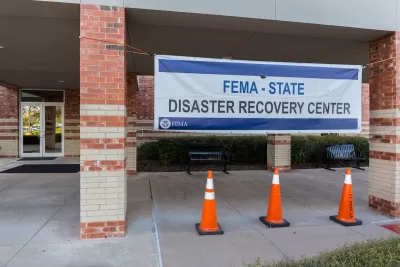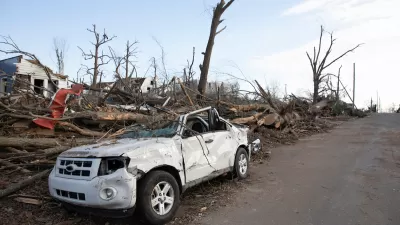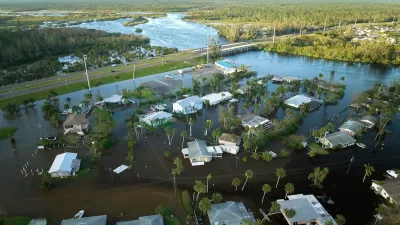The legislation acknowledges the impact of cumulative damage and expands access to funds for communities adjacent to storm-hit states.

A proposed federal bill would let more communities access federal disaster relief dollars, reports Ysabelle Kempe in Smart Cities Dive.
The bill would allow communities “contiguous with a disaster area” that are not in the same state where a disaster was declared access federal funding.
“The Regional Impact of Disasters and Emergencies Relief, or RIDER, Act would also modify the Federal Emergency Management Agency’s definition of a “major disaster” to include cumulative impacts of disasters over a yearlong period, even if none individually meet the threshold for federal relief,” Kempe adds.
The bill aims to assist communities that are often excluded due to technicalities and eliminate the mismatch between federal disaster relief rules and local conditions. According to the bill, the changes “would improve the distribution of disaster relief funds by recognizing that disasters do not neatly follow county or state lines.”
The legislation acknowledges that the cumulative impacts of repetitive storms in one area can pose the same dangers as major single storms.
However, Kempe points out that FEMA has been struggling to keep up with the demand for assistance. In early August, FEMA began operating on an “immediate needs funding” basis in August before Congress authorized an additional $20 billion to keep the agency operating through the hurricane season.
FULL STORY: Bill aims to help disaster-struck communities excluded from federal relief

Alabama: Trump Terminates Settlements for Black Communities Harmed By Raw Sewage
Trump deemed the landmark civil rights agreement “illegal DEI and environmental justice policy.”

Study: Maui’s Plan to Convert Vacation Rentals to Long-Term Housing Could Cause Nearly $1 Billion Economic Loss
The plan would reduce visitor accommodation by 25% resulting in 1,900 jobs lost.

Planetizen Federal Action Tracker
A weekly monitor of how Trump’s orders and actions are impacting planners and planning in America.

Wind Energy on the Rise Despite Federal Policy Reversal
The Trump administration is revoking federal support for renewable energy, but demand for new projects continues unabated.

Passengers Flock to Caltrain After Electrification
The new electric trains are running faster and more reliably, leading to strong ridership growth on the Bay Area rail system.

Texas Churches Rally Behind ‘Yes in God’s Back Yard’ Legislation
Religious leaders want the state to reduce zoning regulations to streamline leasing church-owned land to housing developers.
Urban Design for Planners 1: Software Tools
This six-course series explores essential urban design concepts using open source software and equips planners with the tools they need to participate fully in the urban design process.
Planning for Universal Design
Learn the tools for implementing Universal Design in planning regulations.
Caltrans
Smith Gee Studio
Institute for Housing and Urban Development Studies (IHS)
City of Grandview
Harvard GSD Executive Education
Toledo-Lucas County Plan Commissions
Salt Lake City
NYU Wagner Graduate School of Public Service





























